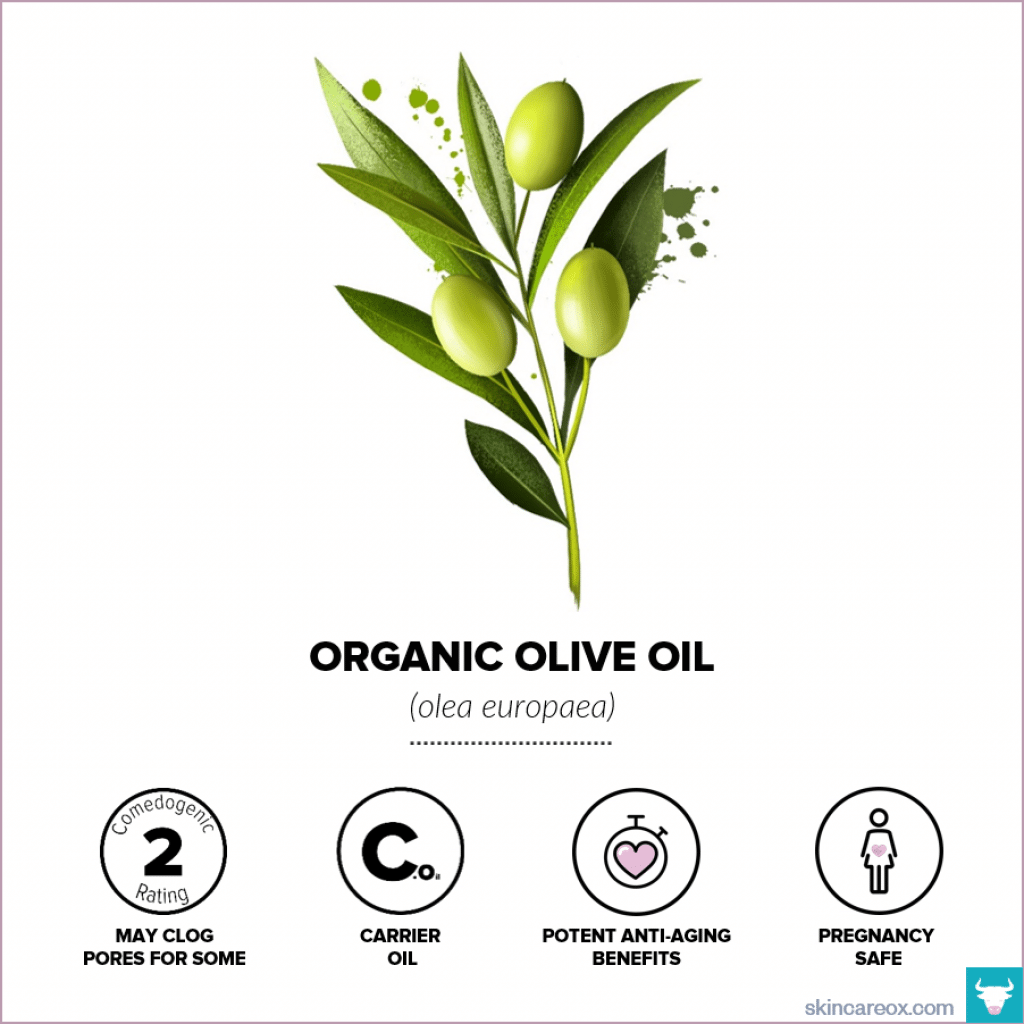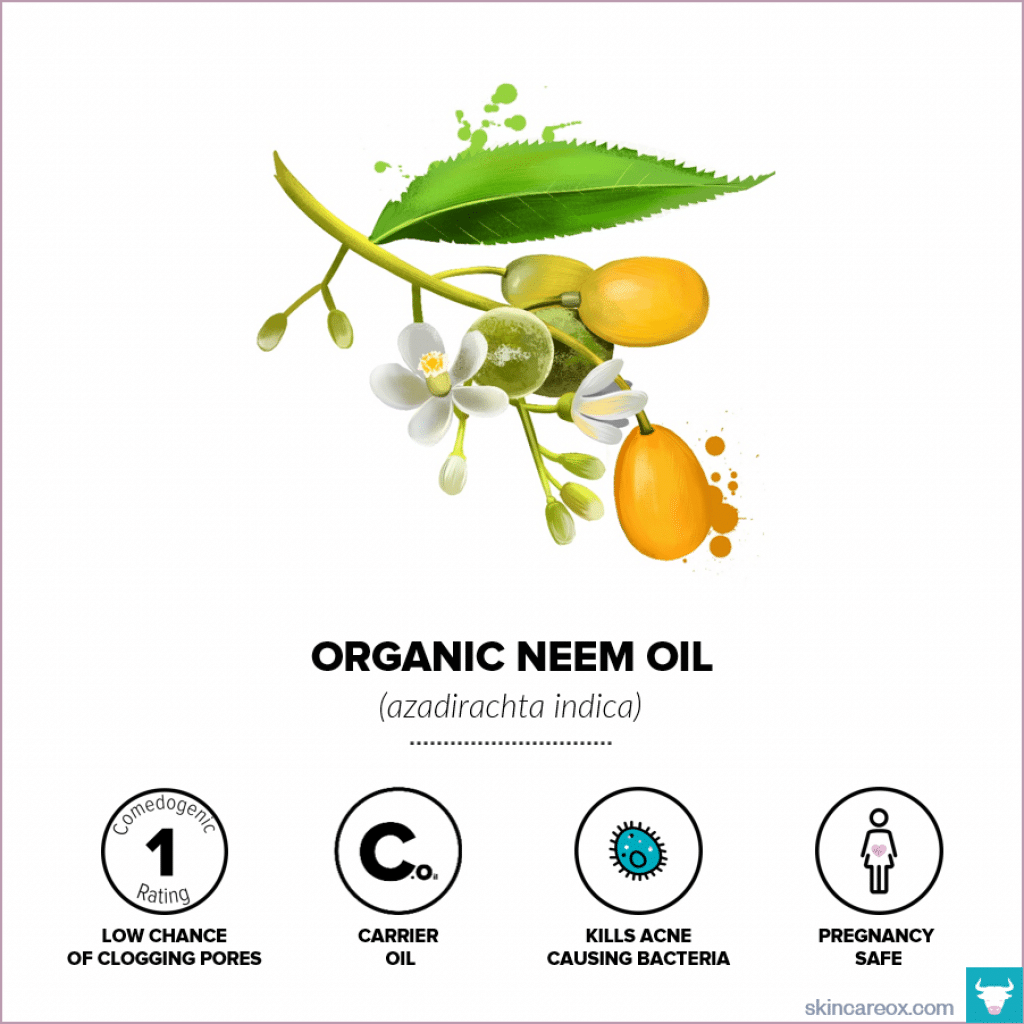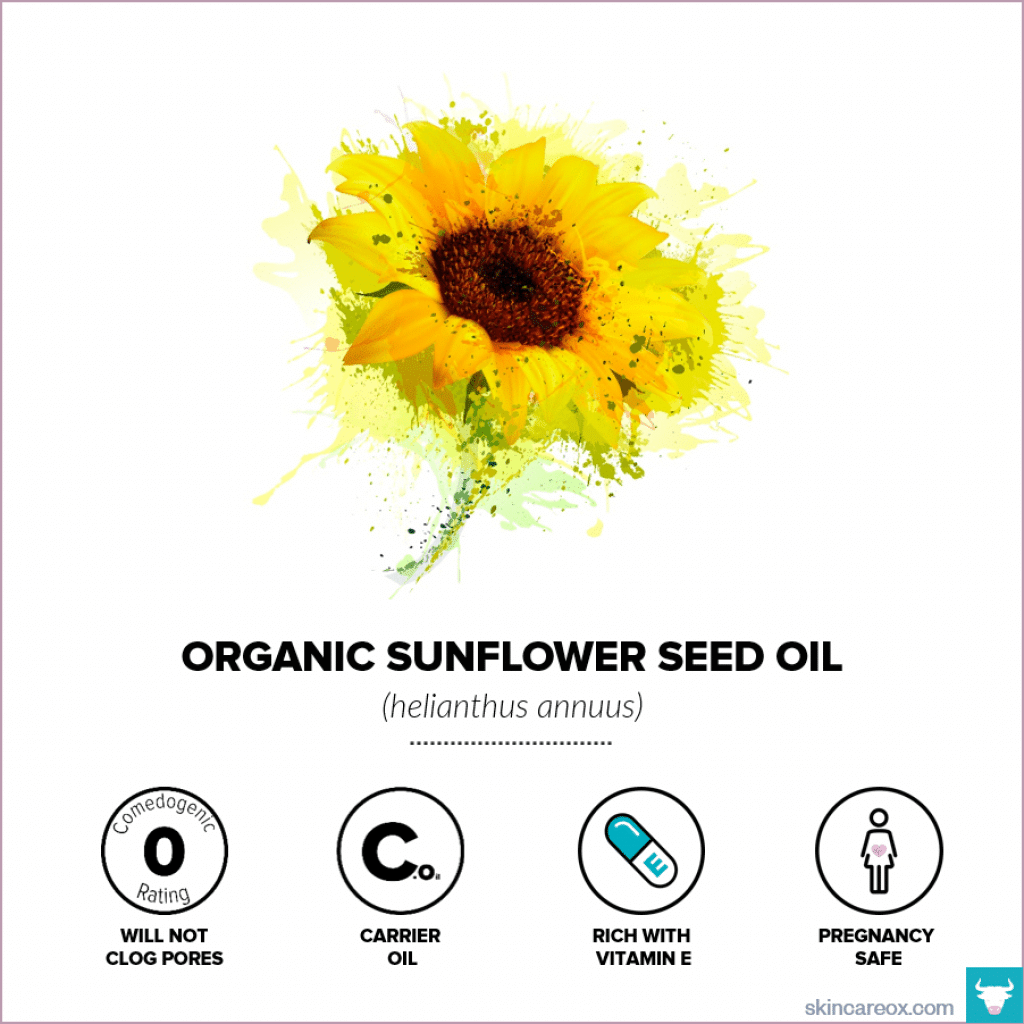
Skincare oils are all the rage! Oils like coconut, jojoba, rosehip, olive, hempseed, and many other oils are now common staples in most DIY recipes and brand-name beauty products.
As their popularity increases, so do the number of questions people have about these oils. Questions like “how do I know which oil is right for my skin?” and “what are the best ways to use certain oils?” are popping up all over the web. That’s why our friends at Skin Care Ox have created this helpful guide on the uses and benefits of the 20 Best Non-Comedogenic Organic Skin Care Oils for All Skin.
Check out the guide, we’re sure you’ll love it! In the meantime, here are our top five tips for using organic skin care oils in your beauty routine:
Tip #1: The highest quality oils are those that are organic, cold-pressed, and free from preservatives.
Tip #2: Always use pure skin care oils immediately after taking a shower (when your skin
is still slightly damp). This helps dramatically with absorption and hydration.
Tip #3: Start with a non-comedogenic oil (oils that won’t clog your pores) with a rating of 0-1. Some of the best oils that won’t clog your pores are grapeseed oil, rosehip oil, sunflower, and hempseed oil.
Tip #4: Did you know that skincare oils can go bad? Common carrier oils have a shelf-life of 1 year or less. Rosehip seed oil, for example, has a shelf life of about 6 months before it begins to go rancid. Never fear, you can easily increase the shelf life of your oils by refrigerating them.
Tip #5: Pregnant women should use extreme caution when using essential oils internally or externally. Some essential oils have been known to induce contractors or cause early miscarriage—so be careful!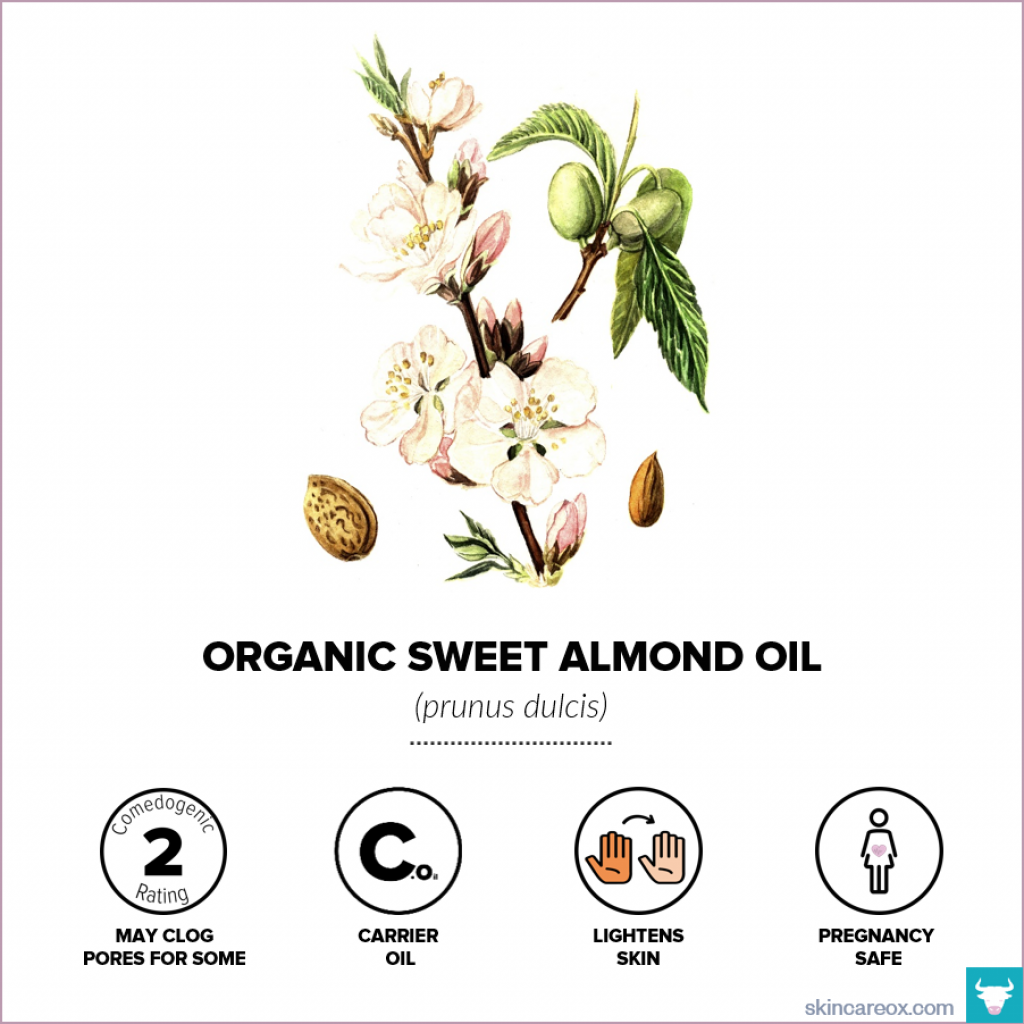 ORGANIC SWEET ALMOND OIL
ORGANIC SWEET ALMOND OIL
ORGANIC NEEM OIL
Scientific Name: Azadirachta Indica.
Oil Type: Carrier oil.
Comedogenic Rating: 1-2
Smell: Strong, pungent smell of garlic/sulfur (not well liked by most).
Color: Orangey-brown to dark reddish brown.
Consistency: Oily/waxy (when liquid), creamy (when solid at cold temps).
Shelf Life: 2 years.
Best for Skin Types: Dry skin, oily skin, combination skin
Best for Skin Conditions: Eczema, psoriasis, acne, acne scars, infections, inflammation
Pregnancy Safety: Safe for external use only during pregnancy.
Fatty Acid Snapshot: Oleic acid (41%), Linoleic acid (19%), Stearic acid (18%), Palmitic acid (16%), Linolenic acid (.44%)
Other Notable Compounds: Azadirachtin, Nimbin, Nimbidin, Nibidol, Quercetin, and Vitamin E.
A staple in Ayurveda, organic neem oil is one of the most potent antivirals.
Neem oil is created from the fruits and seeds of the Azadirachta indica plant.
The secret behind neem oil’s amazing healing properties is its unique blend of compounds including azadirachtin (an insect anti-fungal) , nimbin (an anti-inflammatory and antihistamine), nimbidin (an antibacterial, analgesic, and anti-fungal), and quercetin (an antioxidant, anti-inflammatory, and antibacterial). Neem oil also boasts a low comedogenic rating of 1, meaning it won’t clog pores and promote bacteria growth. On the contrary, neem’s ability to kill harmful bacteria, penetrate deeply into the skin, and reduce swelling make it an ideal spot treatment for those suffering from acne or acne scarring. Neem oil’s only downside is its…less than desirable smell. Often compared to rotting eggs, garlic, and sulfur.
With that said, if you can handle the smell, neem oil can be a savior for dry, irritated skin.
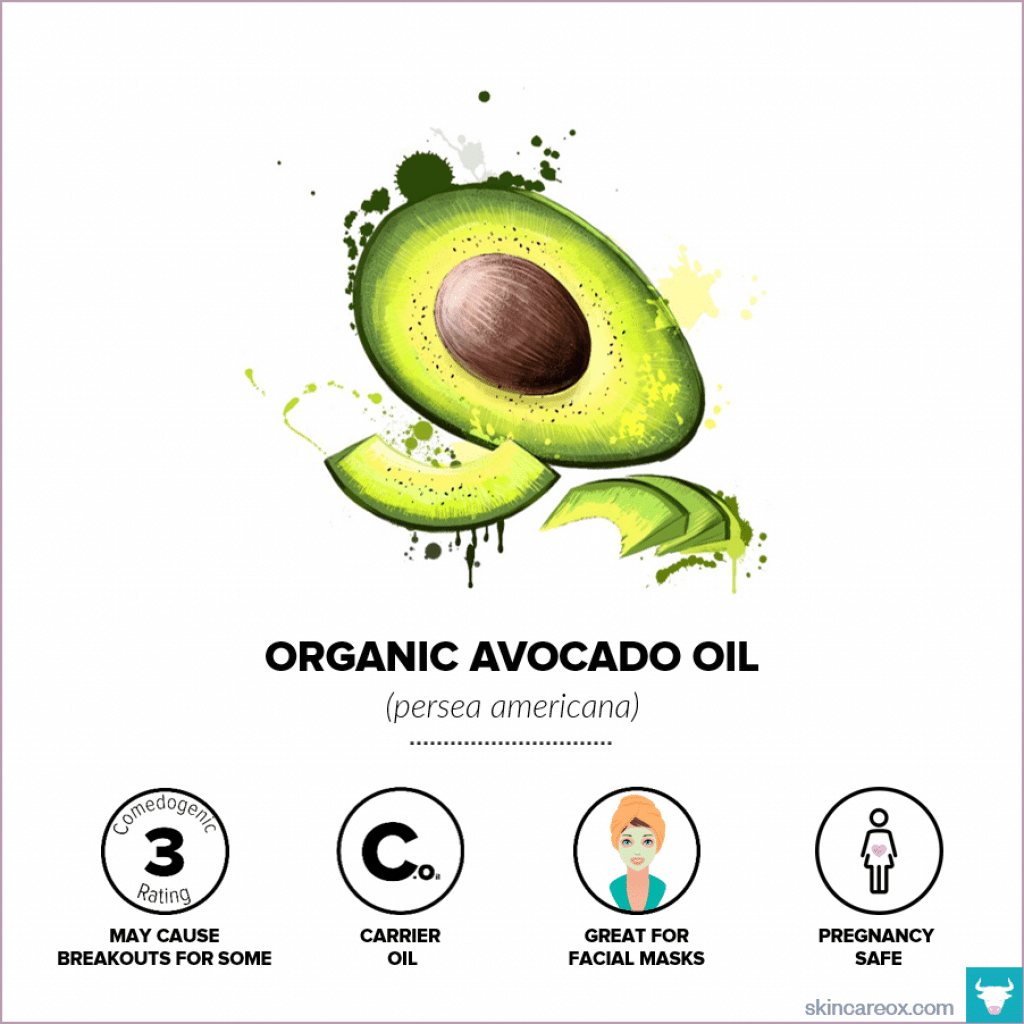
ORGANIC AVOCADO OIL
Scientific Name: Persea Americana.
Oil Type: Carrier oil.
Comedogenic Rating: 3
Smell: Mild nutty smell.
Color: Light to dark green.
Consistency: Thick and oily.
Shelf Life: 1 year.
Best for Skin Types: dry skin, combination skin, sensitive skin, aging skin.
Best for Skin Conditions: Eczema, psoriasis, fine lines and wrinkles.
Pregnancy Safety: Safe for external use only during pregnancy.
Fatty Acid Snapshot: Oleic acid (65%), Linoleic acid (15%), Palmitic acid (15%), Palmitoleic acid (5%), Linolenic acid (.8%), Stearic acid (.1%) [source]
Other Notable Compounds: Vitamin E, Vitamin C, Phytosterols.
Made from expressing oil from the dried avocado fruit, organic avocado oil is a rich, thick, luxurious skin care oil capable of penetrating into the deepest layers of the skin. Once there, avocado oil’s unique blend of phytosterols, omega fatty acids, and Vitamin E get to work by stimulating cell growth, diminishing pore size, and increasing the production of collagen. This deep penetrating action makes pure organic avocado oil a fantastic carrier oil for cleansing. Another major benefit of avocado is its ability to heal scars and diminish age spots due to its high content of plant steroids (sterolins). Essentially, continuous use of avocado oil deeply nourishes skin and can noticeably improve skin tone and moisture levels.
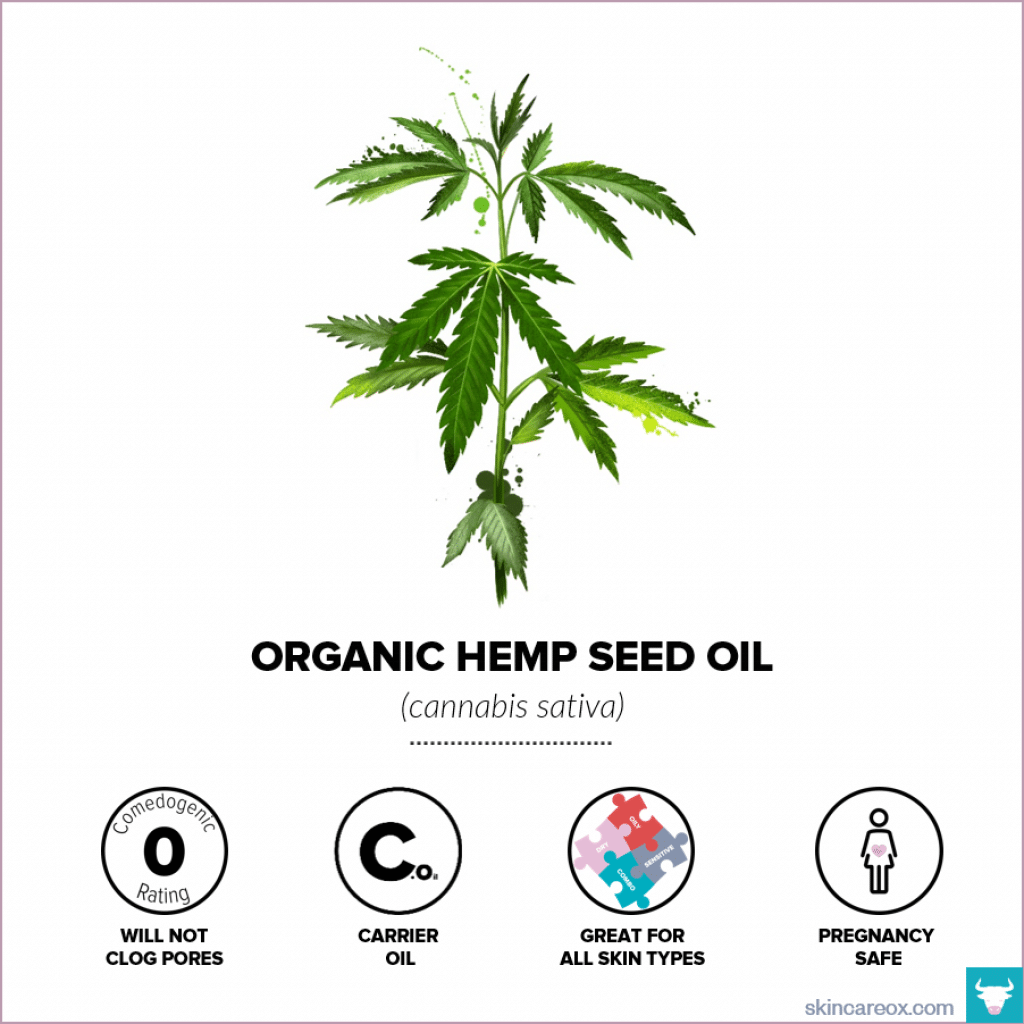
ORGANIC HEMP SEED OIL
Scientific Name: Cannabis Sativa.
Oil Type: Carrier oil.
Comedogenic Rating: 0
Smell: Mild nutty aroma.
Color: Light to dark green (clear).
Consistency: Light “dry oil”.
Shelf Life: 1 year.
Best for Skin Types: dry skin, combination skin, sensitive skin, aging skin.
Best for Skin Conditions: Eczema, psoriasis, fine lines and wrinkles.
Pregnancy Safety: Safe for external use only during pregnancy.
Fatty Acid Snapshot: Linoleic acid (56%), Alpha-linolenic acid (22%), Oleic acid (11%), Palmitic acid (6%), Gamma-linolenic acid (3-4%), Stearic acid (1-2%) [source]
Other Notable Compounds: Vitamin E, Vitamin C, Cannabidiol.
Organic hemp seed oil is unique in that it has a very similar composition of fats and amino acids as our own natural skin oils, making it one of the most well-tolerated carrier oils for all skin types. Hemp seed oil is made specifically from the seeds of the hemp plant and has a different composition than the plant itself. For example, there is no THC in organic hemp seed oil; thus, it is both legal and non-psychoactive unlike other parts of the cannabis plant. What hemp seed oil does include, however, is a huge amount of well-known powerful skin care compounds like Vitamin E, Vitamin C, gamma-linolenic acid (GLA), and alpha-linolenic acid (ALA). In fact, no other oil is packed with as much essential fatty acids as hemp seed. Overall, hemp seed oil is an excellent emollient (hydrates skin), non-comedogenic (won’t clog pores), and improves the appearance of skin by increasing circulation. 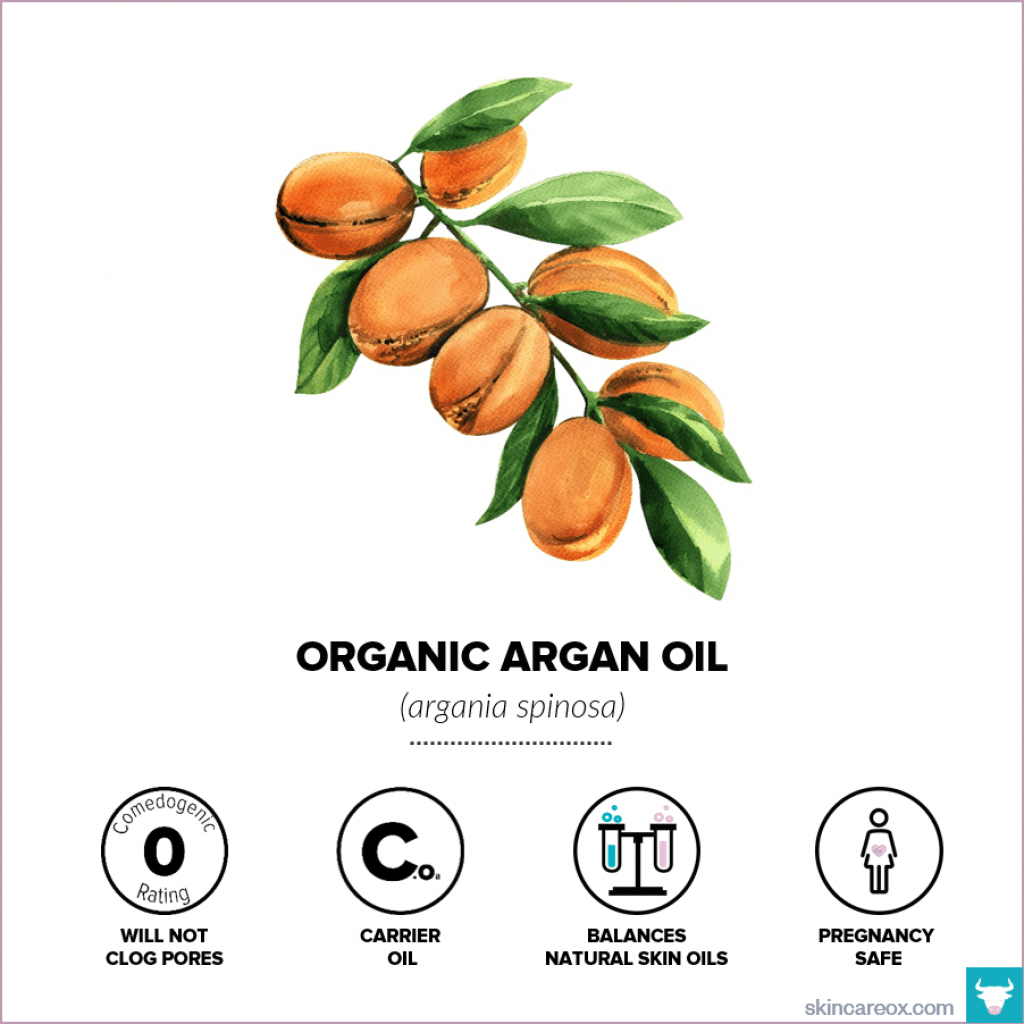
ORGANIC ARGAN OIL
Scientific Name: Argania Spinosa.
Oil Type: Carrier oil.
Comedogenic Rating: 0
Smell: Odorless to a very light nutty aroma.
Color: Golden yellow.
Consistency: Thin, light, non-greasy.
Shelf Life: 2 years.
Best for Skin Types: dry skin, oily skin, combination skin, sensitive skin, aging skin.
Best for Skin Conditions: Eczema, psoriasis, acne, stretch marks, fine lines and wrinkles.
Pregnancy Safety: Safe for external use only during pregnancy.
Fatty Acid Snapshot: Oleic acid (45%), Linoleic acid (35%), Palmitic acid (12%), Stearic acid (6%), Linolenic acid (.1%), Palmitoleic acid (.12%) [source].
Other Notable Compounds: Vitamin E, Vitamin A, Plant sterols, Ferulic acid.
As one of the world’s most expensive oils, organic argan oil (also known as liquid gold) is considered by many to be the holy grail of skin care oils. Like hempseed oil, argan oil boasts a high composition of essential fatty acids and plant sterols without clogging pores. The most powerful feature of organic argan oil is its ability to repair skin damage like acne scarring, stretch marks, and dry skin. The Vitamin E in argan oil penetrates deep into the skin to improve elasticity while triterpenoids work to heal tissue scarring. At the same time, argan’s fatty acids are working to reduce redness, eliminate acne-causing bacteria, and rebalance sebum production to prevent future breakouts. Pure organic argan oil is extracted from the kernels of the argan tree: a plant native to Morocco and the Argan Forest. To this day, extracting authentic Moroccan argan oil is a highly labor intensive (and ancient) process done by local Moroccan Berber women (sometimes by hand). This contributes towards pure argan oil’s quality and high price tag.
ORGANIC SUNFLOWER SEED OIL
Scientific Name: Helianthus Annuus.
Oil Type: Carrier oil.
Comedogenic Rating: 0
Smell: Odorless to faint nutty smell.
Color: Rich yellow to amber.
Consistency: Light and thin.
Shelf Life: 1 year.
Best for Skin Types: dry skin, oily skin, sensitive skin, combination skin, aging skin.
Best for Skin Conditions: Eczema, psoriasis, acne, inflammation, fine lines and wrinkles.
Pregnancy Safety: Safe for external use during pregnancy.
Fatty Acid Snapshot: Oleic acid (30-80%), Linoleic acid (60%), Palmitic acid (6%), Stearic acid (3%), Linolenic acid (.22%) [source].
Other Notable Compounds: Vitamin E, Beta-carotene.
Organic sunflower seed oil is a gentle antioxidant-rich skin care oil that is perfect for beginners. Made from cold-pressed sunflower seeds, sunflower seed oil is light and is easily absorbed by the skin without clogging pores. The most unique feature of sunflower seed oil is its high Vitamin E content. Vitamin E is a potent antioxidant and skin regenerator that can actually help reverse and prevent sun damage, environmental damage, and premature aging caused by free radical damage. Additionally, organic sunflower seed oil protects the skin’s precious collagen and elastin supply, resulting in a more toned youthful appearance. Teenage skin and those who suffer from acne will also benefit because of sunflower seed oil’s potent anti-inflammatory, antibacterial, and low comedogenic properties. Continuous use can eliminate acne while significantly reducing water loss through the skin; thus, resulting in clear and hydrated skin.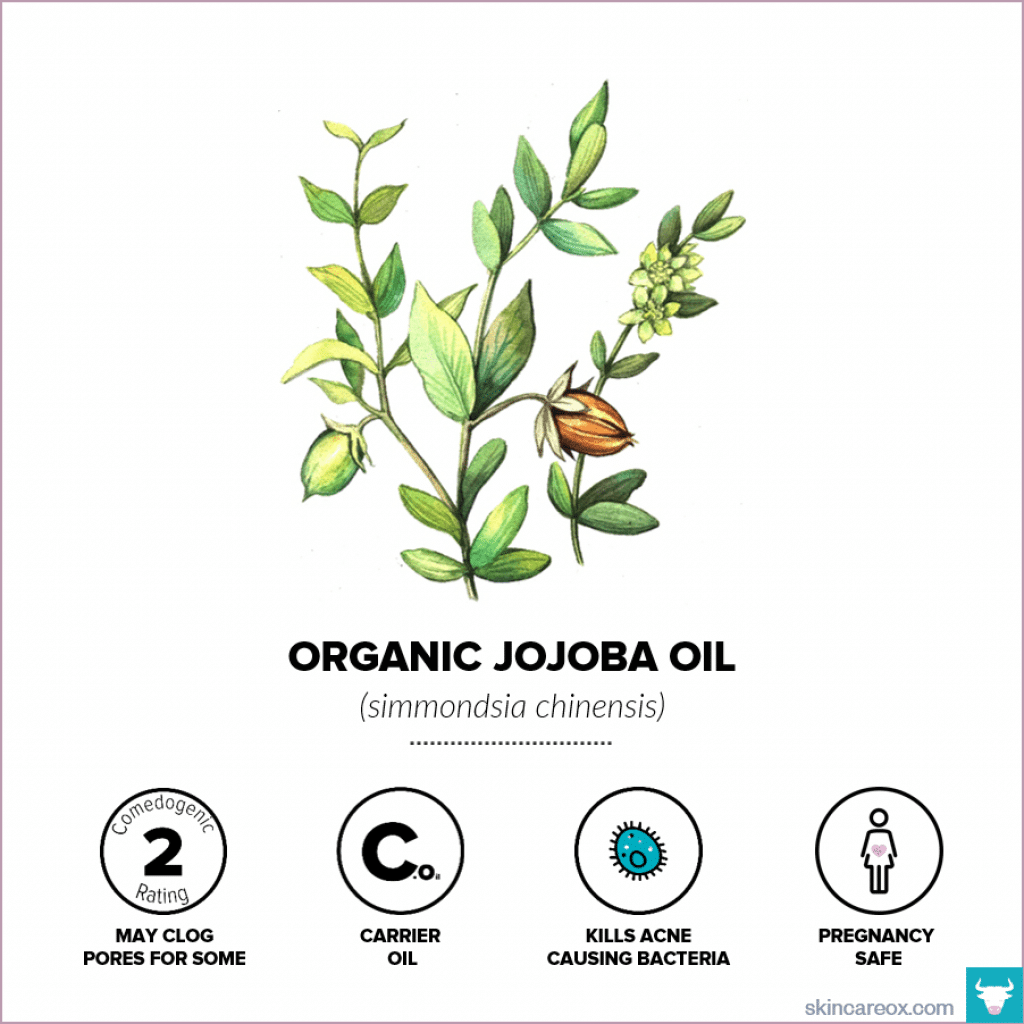
ORGANIC JOJOBA OIL
Scientific Name: Simmondsia Chinensis.
Oil Type: Carrier oil.
Comedogenic Rating: 2
Smell: Odorless to very faint distinct jojoba aroma.
Color: Clear to golden.
Consistency: Liquid wax.
Shelf Life: 5 years.
Best for Skin Types: dry skin, oily skin, combination skin, sensitive skin, aging skin.
Best for Skin Conditions: Eczema, psoriasis, acne, rosacea, scars, fine lines and wrinkles.
Pregnancy Safety: Safe for external use during pregnancy.
Fatty Acid Snapshot: Gadoleic acid (65-80%), Erucic acid (10-20%), Oleic acid (5-15%), Stearic acid (<5%), Palmitic acid (<3%), Palmitoleic acid (<1%) [source]
Other Notable Compounds: Wax esters, Iodine.
Organic jojoba oil is hypoallergenic and safe for all skin types. When organic jojoba oil is applied to the skin, it seamlessly mixes with sebum and forms a thin, non-greasy layer of protection. This layer is porous enough to allow the skin to breathe yet cohesive enough to provide an excellent barrier against moisture loss. Jojoba oil is best suited for oily skin types because of its ability to balance excess oils by literally dissolving them. In addition to providing intense moisture, organic jojoba oil also fights acne-causing bacteria with its rich iodine content, unclogs pores and removes impurities, and fades fine lines. Some people have reported experiencing a “purge” of toxins from their skin (i.e. a small breakout) after using organic jojoba oil. This is normal and should pass within a few weeks 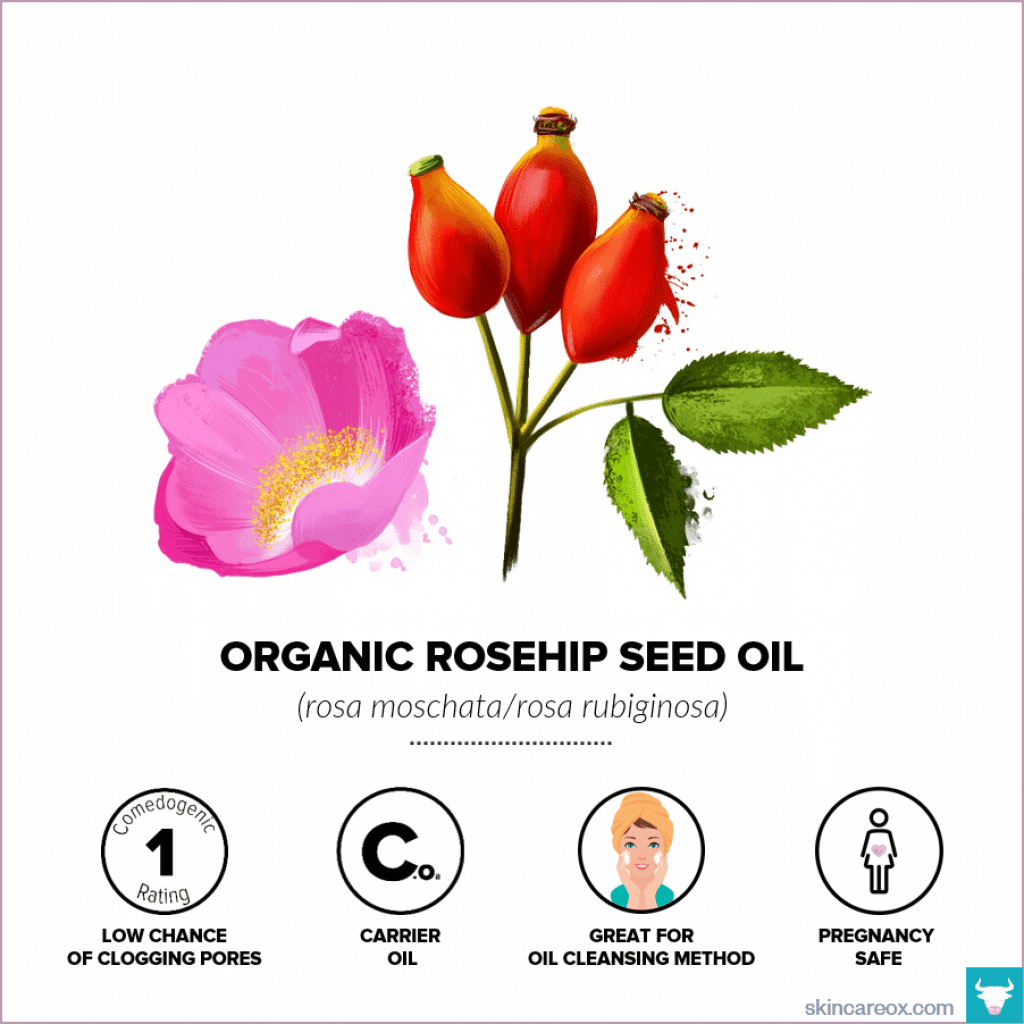
ORGANIC ROSEHIP SEED OIL
Scientific Name: Rosa Moschata/Rosa Rubiginosa.
Oil Type: Carrier oil.
Comedogenic Rating: 1
Smell: Very faint tea-like aroma.
Color: Light orange to reddish organge.
Consistency: Light, easily absorbed.
Shelf Life: 6 months.
Best for Skin Types: dry skin, oily skin, combination skin, aging skin.
Best for Skin Conditions: Hyperpigmentation, rosacea, scars, stretch marks, burns, damaged skin, fine lines and wrinkles.
Pregnancy Safety: Safe for external use during pregnancy.
Fatty Acid Snapshot: Cis-linoleic acid (41-50%), Alpha-linolenic acid (26-37%), Oleic acid (10-20%), Palmitic acid (3-5%), Stearic acid (1-3%) [source]
Other Notable Compounds: Vitamin C, Beta-carotene.
Organic rosehip seed oil has earned quite a reputation over the years. Cheered by skin care experts and celebrities like Miranda Kerr as being “better than Botox,” rosehip seed oil has the ability to dramatically change the condition of your skin. For starters, rosehip seed oil is one of the richest plant sources of Vitamin C. Vitamin C has been proven to effectively stimulate collagen production, penetrate deeply to reduce redness, and increase cell turnover. The essential fatty acids within rosehip seed oil penetrate deeply into the skin where they work to neutralize free radicals, reduce fine lines and wrinkles, and increase the skin’s permeability. The unique combination of fatty acids and vitamins come together to make organic rosehip seed oil a surprisingly great natural remedy for hyperpigmentation and sun damaged skin.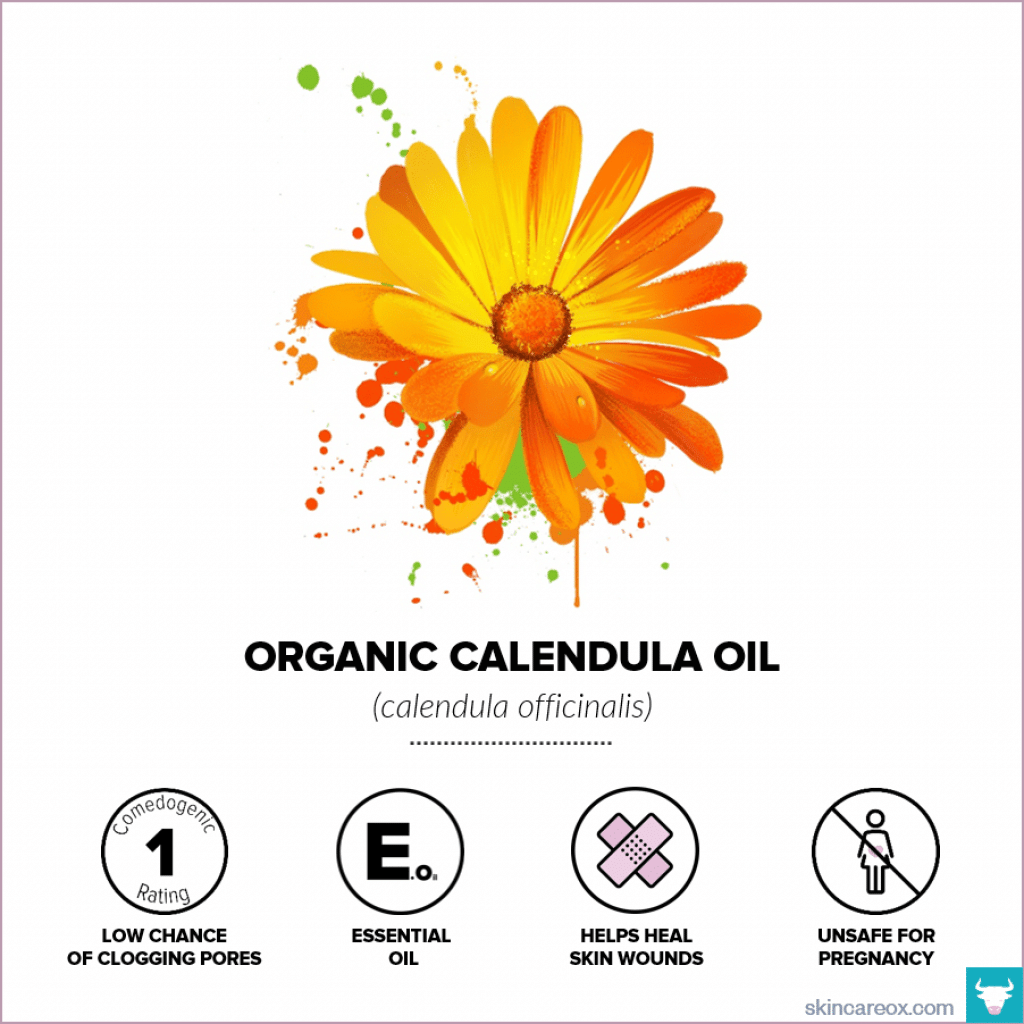
ORGANIC CALENDULA OIL
Scientific Name: Calendula Officinalis
Oil Type: Essential oil
Comedogenic Rating: 1
Smell: Faint floral aroma
Color: Clear yellow
Consistency: Thick
Shelf Life: 1 year
Best for Skin Types: dry skin, combination skin, sensitive skin, aging skin
Best for Skin Conditions: Eczema, psoriasis, acne, wounds, varicose veins, hyperpigmentation, fine lines and wrinkles
Pregnancy Safety: Not safe for use during pregnancy or by those trying to become pregnant. Calendula oil has been known to promote menstruation and possible miscarriages.
Fatty Acid Snapshot: None
Other Notable Compounds: α-cadinol (20%), δ-cadinene (22%), Carotenoids, Flavonoids, Triterpene alcohols [source]
Unlike the other oils on this list, organic calendula oil cannot be obtained in a pure form and. Steam distillation is used to extract some of the oil from parts of the flower; however, in order to extract the oil from the petals of the calendula flower they must be steeped in another carrier oil (like olive oil). This makes calendula oil an essential oil infusion rather than a pure essential oil or pure carrier oil. With that said, organic calendula oil offers tremendous skin care benefits for skin that is irritated, aging, or inflamed. The oil has been shown to kill several strains of antibiotic-resistant bacteria (making it great weapon against acne-causing bacteria) and candida. Additionally, organic calendula oil contains acids which aid wound healing and the formation of new skin. Other great benefits of calendula oil is its ability to soften scars, treat varicose veins, and reduce the appearance of hyperpigmentation. If you are allergic to any plants from the Asteraceae or Compositae families (like ragweed, chamomile, Echinacea, etc.), then it is best to avoid calendula oil as it is a member of that family.
-----------------------------------------------------------------------------------------------------------
To learn more about organic oils, click here for the full article.
This article was written by skincareox.com subscribe to their mailing list for great content about oranic beauty and skincare,


